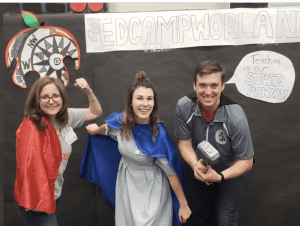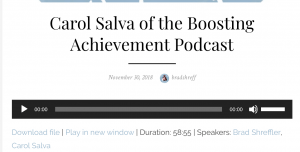This article was originally published in Larry Ferlazzo’s EdWeek Teacher column which you can read right here. You should definitely check out that article for more insight from Tan Huynh and Sara Said.
Refugees and Recent Immigrants, Keeping the Achievement Gap to A Minimum During Covid19
By Carol Salva, Educational Consultant, Seidlitz Education
The Challenges
One of the biggest challenges facing educators during this Coronavirus pandemic, is how to support students who were already at a disadvantage academically. While remote learning can be difficult for any child, Language Learners and students of poverty face unique challenges as the world shifts to distance learning.
For the purposes of this article, I’m going to focus on secondary Students with Limited or Interrupted Formal Education (SLIFE). More specifically, the under-educated students who are new to the English language, are new to American education and may also be new to technology.
I want to begin by calling out the profound lack of equity we are witnessing where these students are concerned. We can’t ignore the division between those with access to digital media and those without such access (van Dijk, 2020). We need to shine a bright light on the negative outcomes of the Digital Divide and demand a change moving forward. But I’m going to push that soapbox to the end of this article and start by offering ideas to help teachers of SLIFE be productive at this time.
The Essential Messages
If you are supporting a language learner who is SLIFE, and may not have access to technology or may lack the experience of using technology, I highly recommend that you align your efforts with four essential messages recommended by John Seidlitz (2019) for working with English Learners (ELs).
- What We are Learning is Important.
- We Will Not Give Up on You.
The Ideas
Ideas for sending the YOU ARE IMPORTANT message:
- Reach out to these families regularly.
- Communication apps like Talking Points or Remind
- Text, call, write letters or postcards.
- United Way Helpline (2-1-1) or www.Unitedway.org for area services
- Immigrants and Refugees and Schools: Laura Gardner, consultant. Family Engagement for Refugees and Immigrants Resources.
- Book drive & distribution
- Try to reach through friends or family.
- Include them in class meetings via phone
- *Any of the following efforts helps send the message that students are important.
Ideas for sending the WHAT WE ARE LEARNING IS IMPORTANT message:
- Be explicit about why the work is important.
- Get training in the basics of Balanced Literacy to be able to infuse reading and writing support in virtual lessons. Bit.ly/BAP062
- Get training in the basics of Second Language Acquisition and techniques for working with English learners Free webinars abound for this right now https://seidlitzeducation.com/webinars
- Encourage native language literacy.
- In the absence of technology, we can send home different leveled readers and encourage students to list, label and copy text in combination with illustrations, creating models or using native language.
- *Many of the other ideas give the message that what they are learning is important.
Ideas for sending the WE WILL NOT GIVE UP ON YOU message:
- Check in regularly and continue to offer ideas for reading and writing.
- Share public broadcasting stations and any education programs. ie: https://www.pbs.org/shows
- Send authentic letters and ask them to write back.
- Organize community partners postcard writing campaign.
- Remind students to read as much as possible (in any language). Remind them of how they are going to gain literacy, the importance of being in print as much as possible. Bit.ly/BAP061
- Find resources at this padlet (padlet.com/CarolSalva1/RapidLit) for engaging projects that students can do asynchronously & share synchronously. Websites for self directed reading are also included there.
- Remember that many virtual meeting platforms allow call-in from a land line or cell phone – include them as much as possible. The tech on your end can help you communicate.
- Send links for videos that teach them how to use an ipad, a chromebook, or other technology.
- Remind/show students that youtube videos can be slowed down, closed captions in different languages, other language support with tech.
- *Many of the other ideas give the message that you’re not giving up on them.
Ideas for sending the YOU CAN DO IT message:
- Show students their progress often.
- Share stories of inspiration with all students.
- Create a video to show students how to use chrome extensions for text-to-speech, voice-typing, etc.
- Send links for youtube videos with culturally responsive narratives of people, like them, who have overcome similar challenges
- Send printed blog posts, links, passages of the same type of inspiring narratives. Many are located at this padlet: https://padlet.com/carolsalva1/SIFESuccess
- Council students to understand the plan for learners who may not pass a class or a grade level. They need to remember that summer school, repeated attempts, tutorials, are all opportunities to improve and get closer to their ultimate goal.
- Make sure they understand growth-mindset. We get smarter, we improve, with more effort.
- *Continued effort and support should lead to gains that help reinforce a student’s perception of their own abilities.
The Long Game
I’ve worked with under-schooled learners for many years and I’ve been amazed at the positive outcomes they can realize when the student and the educator focus on what is possible in the long run. Students who arrived having experienced years of trauma, with no native language literacy, go on to not only catch up, but pass up native English peers. In my experience, these students make the most progress when we partner with them to understand how they are going to advance in their literacy and how they can participate in grade-level learning. One student, Kamal, who still lacks native language literacy, recently told us that he follows the words of Dr. Martin Luther King, Jr. when he feels like giving up. He tells himself that he needs to keep moving forward. You and your students can listen to Kamal right here: bit.ly/KamalForward
The Inequity
I want to lift up all education professionals for the amazing work being done to support these children and all children. I applaud everyone scrambling to create packets so that every child has some type of curriculum materials while away from school. And many of our colleagues are risking personal harm to provide these materials or even a new electronic device to students like these. We should be grateful because much is possible with these tools.
That said, we must realize that we are not offering equity.
Our goal must be equity, and when we say equity we are talking about a level playing field. An equitable learning experience would mean that we are meeting students at their level academically and offering access to the grade level content regardless of their proficiency in the language of instruction and regardless of their socioeconomic status.
Your Plan for Moving Forward
As we do what we can to support students with limited education it is important to reflect on what we might have done differently if we’d known the pandemic would have us at home for so long. One of the silver linings to this devastating virus is that so many people are seeing the inequity that advocates of marginalized populations have seen for years. The world can’t look away from it right now. When schools go to remote learning, the Digital Divide grows greater. Knowing this, seeing what we are seeing, is it any question as to how we must plan for the future? We can help the students who have limited access to tech and little understanding of how to be productive in this current academic environment. We CAN help them. But they shouldn’t be at such an alarming disadvantage. The inequity should never be this profound again. Administrators and program leaders must learn from this experience and prioritize these learners in their new and improved plans they will make for the next time we take school online.
References
Hammond, Z. (2015). Culturally responsive teaching and the brain: promoting authentic engagement and rigor among culturally and linguistically diverse students. Thousand Oaks, CA: Corwin.
Otheguy, R., García, O., & Reid, W. (2019). A translanguaging view of the linguistic system of bilinguals. Applied Linguistics Review, 10(4), 625-651.
Seidlitz, J. (2019). Sheltered instruction in Texas: second language acquisition methods for teachers of ELs. Irving, TX: Seidlitz Education.
van Dijk, J. (2020). The digital divide. S.1.: Polity Press
Villacorta, M. A. (2006). Contingencies of self -worth: Implications for self -determination (Order No. 3208564). Available from ProQuest Dissertations & Theses Global. (305313439). Retrieved from http://ezproxy.stthom.edu:2048/login?url=https://search-proquest-com.ezproxy.stthom.edu/docview/305313439?accountid=7115


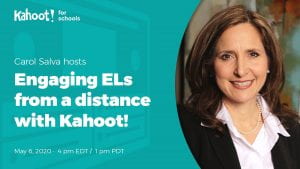

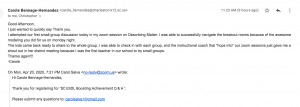
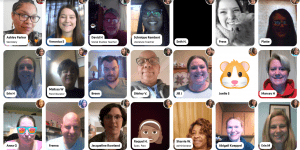
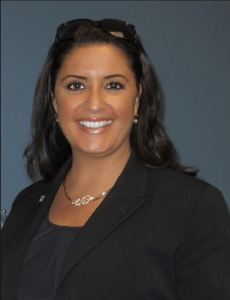



 This makes me want to know more about what is happening at Brad’s school.
This makes me want to know more about what is happening at Brad’s school.